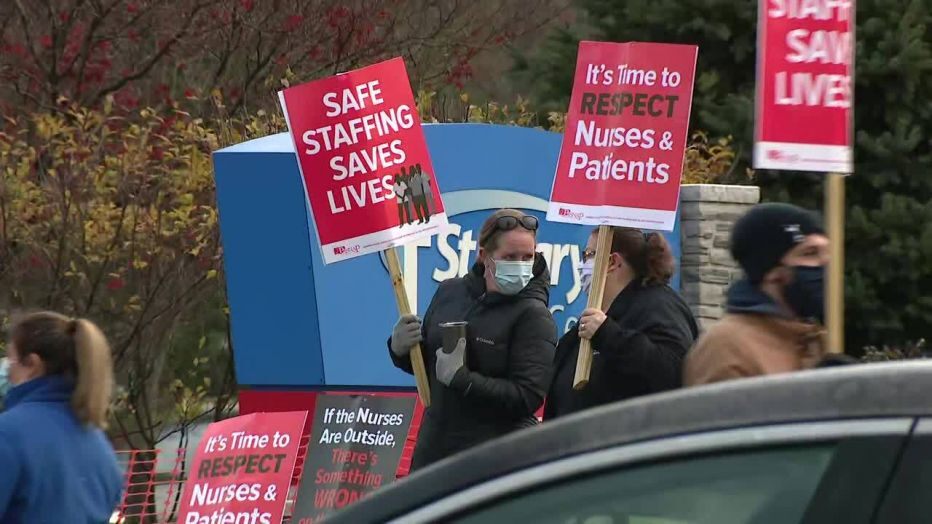On Tuesday, November 17, nurses at St. Mary Medical Center (SMMC) in Langhorne, Pennsylvania, went on strike after management refused to establish safe staffing ratios to confront the growing numbers of Covid cases at the hospital. Left Voice spoke with Drew, who has been a nurse for three years and, for the last year, has worked in the inpatient Endoscopy unit at the hospital. He is a rank-and-file member of the Pennsylvania Association of Staff Nurses and Allied Professionals (PASNAP), which represents nurses at St. Mary, and has been on the picket line during the strike.
Can you give some brief background to the strike? What are your demands?
SMMC nurses organized a union over a year ago, even before Covid-19 dominated our lives, and joined PASNAP in August 2019. The heart of the organizational efforts have centered around safe staffing levels of both nurses and support staff, as well as competitive pay for those professionals. Some 243 nurses have left SMMC in the past two years. Poor pay and limited staff give little incentive for the talented, skilled nurses at SMMC to stay, so they leave for better financial and professional opportunities elsewhere.
Trinity Health, which is based in Livonia, Michigan, acquired SMMC four years ago. According to Trinity’s own audited financial documents, St. Mary made an average of $58 million in annual profits over the last three years.
The demand that has seen the most resistance is “minimum safe staffing grids.” Trinity wants complete control over staffing. Symbolic concessions from Trinity include a committee with nurses on it to discuss staffing issues, but that has no mechanism to hold Trinity accountable.
Why do you think it was necessary to turn to a strike, a refusal to work, given these conditions? Is it important for workers to refuse to work in conditions like the ones you’re facing?
I recognize that even in labor circles, nurses going on strike during a pandemic is not without criticism. PASNAP has been negotiating for a contract for over a year to no avail. Showing up at the bargaining table constantly and in good faith without results has left us with no other option. Personally, being forced to offer substandard care day-in and day-out convinced me it was necessary to strike. The decision to turn to a strike was not made lightly, but I firmly believe this will enable me and my peers to provide care that we will be proud of.
Nurses are on the front lines in the midst of a brutal and historic health crisis that’s been bungled at every level. They’re being asked to risk their lives and well-being after economies have been wrenched open to ensure the flow of profits. What do you think are the major changes needed in the U.S. health system, and why?
This is a conversation that is happening on the picket line in Langhorne, and I’m sure with every nursing organizational effort across the country. Nurses are being forced to ask: Why are we being taken advantage of? Why have conditions gotten worse when we were sold to a prestigious, faith-based company that owns 93 hospitals in 22 states? The resentment over for-profit healthcare is crescendoing among the nursing staff. Preventable illnesses being ignored due to insufficient insurance means patients are only seen when they are incredibly ill. Many of my peers see socialized medicine as inevitable, since for-profit healthcare is not sustainable.
What kinds of dangers do nurses face because of the lack of staffing, especially during a pandemic? Why is it crucial for nurses to win safe staffing now?
As always, our first priority is quality patient care. There are countless studies that show that for every additional patient a nurse takes on, the rates for infections, patient falls, medication errors, and mortality increases. Nurses at our hospital have been very vocal about their frustration at not being able to ensure hourly turns for necessary patients and not being able to spend moments with patients to share some human comfort. Understaffing is associated with high nurse turnover as well, and is absolutely responsible for the 243 nurses that have left SMMC in the past two years. Nurses are burning out and fleeing the bedside in droves.
This moment — when the public eye is on healthcare — is the moment to advocate for our patients and ourselves.
The communication between SMMC, St. Chris, Einstein, and especially Mercy Fitzgerald have been so important for things like coordinating strike efforts, but what may not be obvious is the amount of emotional and psychological support provided by the nurses of those hospitals. I’m sure most people who have participated in organizing and union efforts have felt a sense of doubt. It is natural to question if striking is the right thing to do or if all the work involved is worth it. Although these hospitals may have not had formal coordination, the networking and human infrastructure being built between these regional hospitals is real and has only improved.
So far, only one of Trinity’s hospitals — St. Mary — has gone on strike. Is it important that the other hospitals, too, take militant action together to win demands?
Nursing staff and other healthcare professionals are in a stronger position to advocate for ourselves and our patients if we take action together. It may be obvious to many, but sitting at a table with representatives from a multimillion-dollar company and begging for the bare minimum staff needed to provide adequate healthcare is not productive. Strikes and other forms of resistance are the only way to have your demands heard. I can only imagine the power our strike could have if multiple hospitals in the region were picketing this week.











